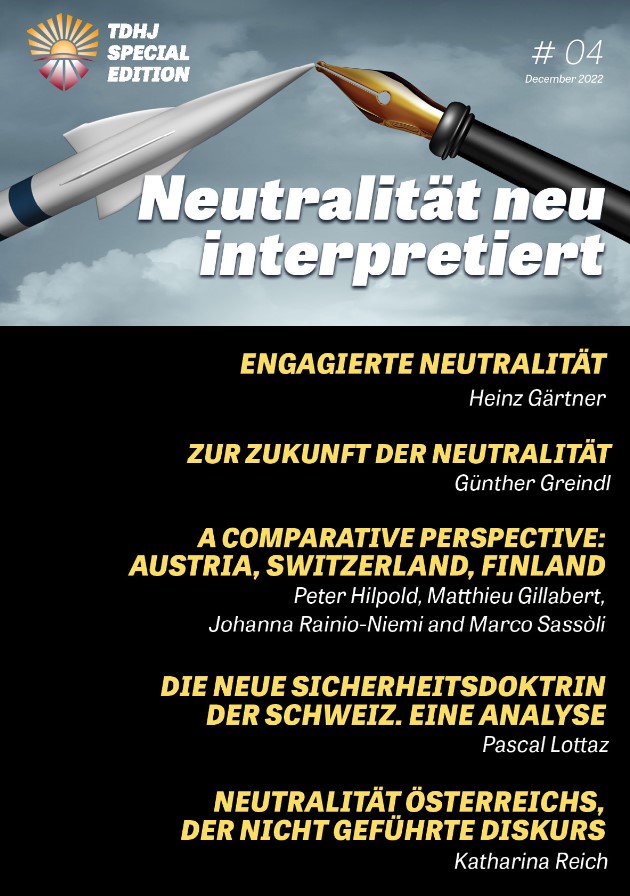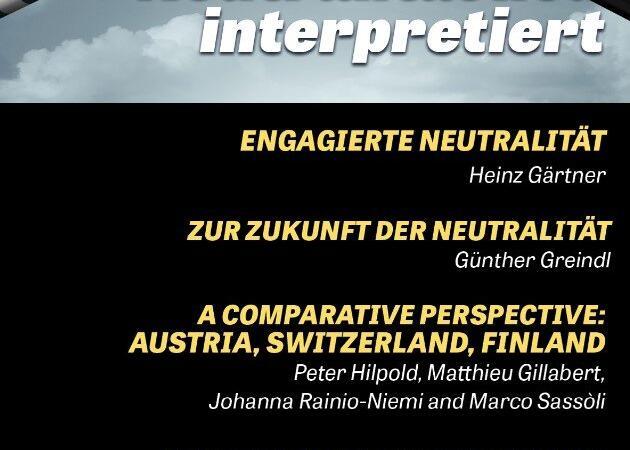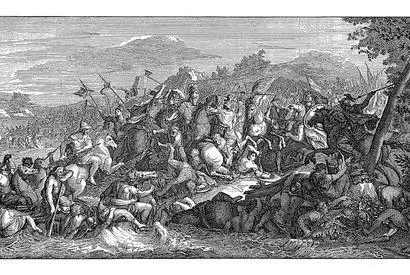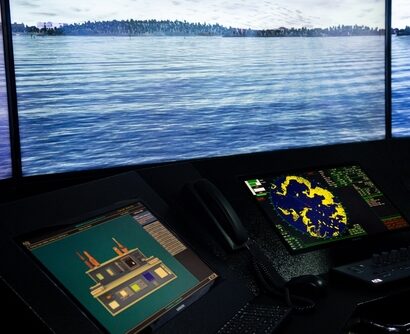Review of TDHJ Special Edition No.4/22

Source: TDHJ Special Edition 04/22
The Defence Horizon Journal (TDHJ) initiated the publication of Special Editions aimed at offering deeper and more comprehensive insight(s) into selected topical problems. This review discusses the content of TDHJ Special Edition No. 4/22 and is entirely devoted to the topic of neutrality.
The issue of neutrality came into the limelight of recent political deliberations due, most recently in regard to the war in Ukraine, which rekindled the apprehension amongst European politicians and society about the probability of Russian westward expansion. Further interest in the subject neutrality vs. block mentality was heightened by the Finnish and Swedish governments’ respective decisions to abandon non-alignment as the cornerstone principle of their security and foreign political doctrine, and place their security arrangements under the NATO umbrella.
Further interest in the subject neutrality vs. block mentality was heightened by the Finnish and Swedish governments’ respective decisions to abandon non-alignment as the cornerstone principle of their security and foreign political doctrine.
The snowball effect did not stop there. In other traditionally neutral European countries, such as Austria and Switzerland, certain political circles, pundits and broader society initiated discussions about the possibility for them to follow suit. All of this, while firmly believing that the sole security guarantee against the perceived Russian threat was to join NATO, seen as a protector of peace, security and stability in Europe.
TDHJ Special Edition’s five articles on neutrality certainly could not cover the multifaceted nature of this issue, such as complexity. While the Edition does not pursue such a purpose, the articles consider several critical aspects of neutrality, which can be most helpful in better understanding its problematics and dynamics.
The Bid for Engaged Neutrality
Heinz Gärtner
One should start with Heinz Gärtner’s fundamental approaches to neutrality. The first principle is that neutrality does not signify staying aside and not taking a position in a conflict situation. According to Gärtner, “engaged neutrality” means involvement whenever possible and staying out only if necessary. The second principle is that while refraining from taking part in war or military operations, neutral states can propose diplomacy and mediation. Third, neutrality “can represent a good security guarantee.”[1]
Simultaneously, the situation for a military block member state is quite different. Referring to several studies, the author underlines that the more strictly and consistently a state observes its commitments toward a military block, the more the probability of its embroiling in a war. What is more, for the small states, participation in a block deprives them of diplomatic flexibility and the ability to avoid international crises that might transform into open war.
Further, the author examines concrete examples starting with Austria and continues with the cases of Finland and Sweden. Two major points should be stressed in the article’s treating Austrian neutrality. First, neutrality for the Austrian people is unalienably linked to the notion of independence and national identity. Second, the Austrian political establishment developed (under Bruno Kreisky) a political strategy of “active neutrality”. Said strategy allowed it to actively participate in international organizations and to contribute on a multi- and bilateral basis to the promotion of peace, democracy, political, economic, and cultural cooperation among the peoples of the planet. It is not by chance that Vienna became home to the third UN headquarters after New York and Geneva, also hosting the Secretariats of the OSCE and the OPEC, let alone highest-level political meetings to resolve critical issues of utmost impotence, such as the negotiations on the Iran nuclear deal.
Against the background of Austria, Gärtner analyses the decisions of Finland and Sweden to join NATO. Arguably, those decisions were triggered by the war in Ukraine and the fear that Russia might invade the Baltic states, thus increasing those two states’ insecurity in their immediate vicinity. However, as the author rightly underlined, while the situation along the Russian-Finnish border was secure, after Finland joined NATO, it has the potential to become increasingly tense. The reason is as simple as it goes: NATO military bases and armaments, including nuclear ones, will be deployed on Finland’s territory in St Petersburg’s vicinity, thus transforming the formerly neutral country into Russia’s target, the latter having no other choice but to deploy its missiles and other heavy armament along the Finnish border. The situation with Sweden’s security should be considered in the same context.
According to the article, while Finland and Sweden’s NATO membership might have a deterring effect, in the case of escalation, they can not be spared from getting involved in an all-out war because membership not only provides security guarantees but also brings about obligations vis-à-vis the allies.
NATO military bases and armaments, including nuclear ones, will be deployed on Finland’s territory in St Petersburg’s vicinity.
The final part of the article is devoted to the notion of “engaged neutrality”. For the author, “neutrality has a traditional and an engaged face.”[2] The traditional one is no longer helpful in meeting modern times’ challenges. Contrary to this, engaged neutrality can help overcome those challenges by contributing to peace, stability and economic cooperation through active political/diplomatic efforts. The example of Austria is an excellent testimony to this. It is a member of the UN and the EU, and shares universal values with both. It can take part in peacekeeping operations without ever permitting a superpower to use its territory to deploy military bases.
One can only agree with Heinz Gärtner’s concluding analysis about the relapse in a Cold War-like situation, characterized by the formation of new blocks and harsh confrontation with the participation of the USA, Russia and China. As the author points out, the neutral states should not be involved in these blocks or global and regional conflicts. Rather, they should instead apply all political and diplomatic tools, including mediation, to resolve those conflicts.
The Future of Neutrality
General (ret.) Günther Greindl
This article aims to answer the three key questions: 1. Why is Austria neutral?; 2. What role does neutrality play in the global security architecture?; and 3. What does neutrality mean within the European Union?
Answering the first question, the author argues that Austria’s neutrality is due to historical and geopolitical factors, which have urged the country to adopt a balanced approach based on non-participation in military blocks, impartiality and consideration of interests, sometimes conflicting, of different States. Coupled with the measures of self-defence and military preparedness to oppose any aggression, as well as peace-promoting and conflict-resolution policy, this kind of active neutrality, according to General Greindl, has greatly contributed to Austria’s peaceful development and achievements. Active neutrality should not be given up because it is a reliable security arrangement that encourages Austria to promote the agenda of international peace and security.
Under the second question on Austria’s place in global security architecture, the author emphasizes its participation in the UN peacekeeping operations, in the OSCE activities and in its relations with NATO. Only three months after the adoption of the Law on Neutrality, on December 14, 1955, Austria adhered to the UN and has since then committed more than 120,000 troops to the organization’s peacekeeping operations in different politically and security-wise volatile regions of the world. General Greindl not only highly appreciates the courage of Austrian men and women but is of the firm opinion that there are no grounds that could lead the country to stray off such a path.
Only three months after the adoption of the Law on Neutrality, on December 14, 1955, Austria adhered to the UN and has since then committed more than 120,000 troops to the organization’s peacekeeping operations.
Regarding accession to NATO, not only does the Law on Neutrality prohibit such a development, but Austria’s membership in the North-Atlantic military organization would be disadvantageous from strategic and security points of view. Thus, in the case of war involving NATO countries, Austria would be obliged to take part in the conflict and allow the deployment of NATO troops and armaments on its territory. Under such circumstances, it would become a legitimate target for Russian missile attacks. The conclusion is clear-cut: “Accession to NATO will not bring any security advantage that could justify the relinquishing of neutrality.”[3]
The answer to the third question, i.e., the degree of compatibility of Austria’s neutrality with its EU membership, seems more complicated. True, when adhering to the EU, Austria made a reservation indicating its neutrality status, and Article 42.7 of the Lisbon Treaty grants “certain Member States” the right to refrain from “aid and assistance by all means” to a Member State, “victim of armed aggression on its territory” (Irish guarantees). Furthermore, Austria complies with the Common Foreign and Security Policy (CFSP) and the Lisbon Treaty’s Article 222 (solidarity clause), which entail participation in EU crisis prevention and management missions, rapid and joint response to terrorist attacks.
In General Greindl’s opinion, the implementation of these commitments in practice creates a permanent tension field (Spannungsfeld) insofar as matching neutrality with solidarity, participation in crises management and resolution, observance of Common Security and Defence Policy (CSDP) and CFSP may easily become subject to controversy. Moreover, as the author points out, the initial intention of EU founders was that the union of European States should become not only an independent economic power. It should also acquire considerable political weight. This vision, however, did not materialize. To substantiate this view, he refers to the European Council Conclusions of December 2013, which stated: “The Common Security and Defence Policy (CSDP) will continue to develop in full complementarity with NATO in the agreed framework of the strategic partnership between the EU and NATO…. .” As well, from a collective defence alliance, NATO has morphed into a “new NATO”, which stands for harmonizing its own strategic interests with those of the US, and has committed itself to react to the security challenges that threaten America.[4]
It goes without saying that the EU’s increasingly tangible dependence on NATO’s hegemon state poses problems for Austria as catering to American strategic interests is diametrically opposite to the principle of and strategic option for neutrality. Therefore, General Greindl is firmly convinced that abolishing the EU’s decision-making principle of consensus would not be in Austria’s best interest. It would put an end to any flexibility in observing neutrality. The article’s message is clear and loud: CFSP objectives meant to pursue European interests independently can only be reached when the EU can assume responsibility for its own security.
General Greindl is firmly convinced that abolishing the EU’s decision-making principle of consensus would not be in Austria’s best interest. It would put an end to any flexibility in observing neutrality.
The author concludes with advocacy for a multipolar world as the best chance to establish peaceful cooperation among nations. As a neutral state, Austria has all the prerequisites to further contribute to peace and stability. Its EU membership cannot be an obstacle, provided that the EU restores its vision of being an independent political and economic power. And finally: “Neutrality has a future. There is no ground to abandon it.”[5]
Neutrality Law in a Comparative Perspective: Austria, Switzerland, Finland
Peter Hilpold, Matthieu Gillabert, Johanna Rainio-Niemi and Marco Sassòli
This article may seem partly outdated insofar as one of the three countries has rescinded its neutral status to join NATO. The analysis nevertheless remains relevant. It provides thoughtful insight into the relationship between the legal and political aspects of neutrality in general. Also, it explains Finland’s incentives and prerequisites to adopting the strategically crucial decision.
The authors underline the importance of undertaking a comparative analysis of legislation in the field of neutrality. In their opinion, it is due to the scarcity of such analyses, but first and foremost, because “the law on neutrality has undergone profound changes since WWII.”[6] The war in Ukraine has urged the governments of neutral countries to reconsider their approaches and redefine neutrality’s function within the modern international legal ecosystem.
The article is divided into three major sections, each examines the respective legislation in the above-mentioned states to find common denominators and answer the major question on the compatibility of neutrality law with contemporary international law. Commenting on public discussions is yet another interesting part of the analysis.
Austria
Peter Hilpold’s input represents an entirely different approach compared to the preceding articles on Austrian neutrality. This article argues that “there is no longer any substance in Austrian neutrality law, but politics – and large parts of the Austrian population – continue to ignore this.”[7] The Austrian academic believes that joining the EU and CSDP, and cooperating “directly” with NATO deprives the notion of neutrality of any meaning. Further, he refers to Austria’s full participation in sanctions against Russia and contribution to Ukraine’s assistance projects within the “European Peace Facility” framework as another convincing argument to that effect. In another research paper, he calls Austrian neutrality a myth, a stopgap (Lückenbüßer) that must, given its intrinsic link with Austrian identity and within the limits of possibility, be regularly given a new breath.[8]
Switzerland
As with Austria, neutrality has become a part of the people’s identity in Switzerland. It is largely believed that the country previously avoided devastating wars thanks to it. Better said, neutrality has almost become “a religious dogma.” Nevertheless, the war in Ukraine has triggered a wave of public debate. The core problem is not whether the country should continue sticking to the principle of collaborative neutrality, the major question is rather: with whom to collaborate?
Neutrality has become a part of the people’s identity in Switzerland. Better said, it has almost become “a religious dogma.”
The contribution’s second part examines Swiss neutrality from the viewpoint of international law. The author underlines five points that touch upon the issue from different angles. One of his arguments is that neutrality should not be abandoned. Russia’s aggression on Ukraine is not unique, and hasty decisions should be avoided. “Neutrality facilitates offering good offices, including the role of “International Geneva”.”[9]
Finland
On April 04, 2023, several months after the publication of TDHJ Special Edition No. 4/22, Finland became the 31st NATO member. This section is most helpful in understanding that such a decision was not due to the war in Ukraine, as it may appear at first glance. Rather, it came as a result of a decade-long historical drift from the obligations stemming from the 1948 Treaty on Friendship, Cooperation, and Mutual Assistance between the Soviet Union and Finland toward joining the European political structures and, in the final analysis, the Euro-Atlantic military organization.
In 1995, Finland, Austria, and Sweden acceded to the EU, and as the author has stressed: “… the concept of neutrality was erased from the public policy vocabularies.”[10] Nevertheless, Finland has remained decades outside military blocs, which contributed to the country’s active participation in multilateral diplomacy, UN-related missions and mediation, and the provision of good services. One must equally add that the Final Act that founded the Organization (at the time of signing – Conference) for Security and Cooperation in Europe was signed in 1975 in Helsinki. Since then, the Helsinki spirit has become part of the diplomatic vocabulary, symbolizing security, cooperation, and solidarity in the geopolitically acknowledged space of Europe from Vancouver to Vladivostok.
“Cooperation” before “Neutrality”: Switzerland’s new Security Doctrine. An Analysis
Pascal Lottaz
Pascal Lottaz is in unison with Matthieu Gillabert, one of the two authors of the previous article’s section on Switzerland, that the definition of “cooperative neutrality” best characterizes the country’s foreign political strategy, and that the emphasis on the definition should be placed on the word “cooperative” rather than “neutrality.” However, while for Gillabert, the central question is “with whom to cooperate”, for Lottaz, the answer does not raise any doubt. Referring to the Additional Report to the 2021 Report on Security Policy, adopted by the Swiss Federal Council in 2022, he underlines that in light of the war in Ukraine, “preparations for collective defence with NATO and EU-states are now official Swiss security policy.”[11] The Report does not mention international security organizations, such as the UN and the OSCE, nor does it consider any aspects of relationships with China or Russia. Its cornerstone principle is that Switzerland belongs to the West and, hence, should closely cooperate with Western institutions.
Preparations for collective defence with NATO and EU-states are now official Swiss security policy.
One should also add that here, we deal with a clear tension between neutrality and solidarity, as in the case of Austria. In Switzerland’s case, the additional report seems to be more determined to enhance military cooperation with NATO. Indeed, this new military-political strategy stems from the assumption that in the case of aggression, the country should protect its territory in alliance with other states. There is little doubt that “other states” means the North-Atlantic alliance.
In broader geopolitical terms, Pascal Lottaz rightly demonstrates that apart from the ongoing “hot” war between Russia and Ukraine, we undoubtedly have been witnessing a new “cold” war, whose protagonists are Russia and China, on the one hand, and the collective West (NATO and some other states), on the other.[12] Whereas in the context of the “hot” war, the Swiss Federal Council unequivocally sticks to the principle of neutrality, in the case of the “cold” war, its attitude is diametrically opposite. Switzerland has opted to join the Western block and support, in the author’s words, so often invoked but so little elaborated “value rules” (Wertekanon) of the collective West.
Austrian Neutrality Discussion that has not been conducted
Katharina Reich
This article is the fourth contribution to TDHJ Special Edition No. 4/22, focusing on the Austrian case. It contains several aspects that distinguish it from the other three.
The first specificity is that Katharina Reich considers Austrian neutrality not as a given phenomenon but as an ongoing process in full swing. From this viewpoint, there are three distinct alternatives in terms of Austria’s repositioning in security guarantees. These are: a) Austria’s accession to NATO; b) neutrality with Austria arming itself; c) a common EU army. The author provides a succinct analysis of all three strategic choices without advocating for either of them. Rather, she is of the firm opinion that there is a need to initiate broad discussion among society to explore which alternatives might be accepted as the most suitable path to follow.
There are three distinct alternatives in terms of Austria’s repositioning in security guarantees: a) Austria’s accession to NATO; b) neutrality with Austria arming itself; c) a common EU army.
Likewise, the author is quite doubtful that Austria will ever rescind its neutrality status because neither a two-thirds majority in parliament nor a referendum outcome against neutrality could be obtained, even more so as very few political parties could agree on a unified stance on the issue. Nevertheless, should the situation change, the adoption of any strategic decision ought to be agreed upon through a popular referendum “because the population pays for Austria’s defence and is the decision-maker to alter neutrality.”[13]
Another important new element for discussion stems from the fact that at this historic stage, neutrality has entered a new phase of post-neutrality. Reich suggests that establishing an alliance of neutral peace protectors entrusted with specific tasks would open new prospects for European cooperation under new circumstances. That kind of alliance could include all neutral European states (Austria, Ireland, Liechtenstein, Malta, Switzerland and Vatican). Moldova could also join this grouping in the case of international acknowledgement of its constitutional principle of neutrality.
The article furthermore stresses the potentially significant contribution of such an alliance to maintaining the European peace environment. In addition, this grouping of neutral states could use its diplomatic and peace negotiations skills, accumulated through centuries-long European experience in war and peace, to play a prominent role in advancing the global agenda for security and cooperation.
Reich concludes that with the establishment of the Alliance of European neutral states, the definition of “post-neutrality”, so far amorphously formulated by some scholars, could acquire a new shape and content. In particular, these states could play the role of mediators and arbitrators, promoting economic cooperation apart from political cooperation among the states.
Conclusions
Perhaps, it would be worthwhile presenting to the reader’s judgment the reviewer’s comments on some aspects of the highly topical and important issues raised in TDHJ Special Edition No. 4/22. We will concentrate on the Austrian case, which the publication has extensively covered.
TDHJ Special Edition’s four contributions on Austrian neutrality can be considered partly complementary and partly contradictory. Thus, both Heinz Gärtner’s and Geneneral Greindl’s articles advocate for engaged, active neutrality, the latter complementing the former by introducing the notion of tension field (Spannungsfeld) when it comes to matching active neutrality with solidarity and joint actions within the EU.
Contrary to this line of analysis, Peter Hilpold unequivocally argues that the cooperation with other EU members within the CFSP and CSDP frameworks, as well as “directly” with NATO, especially in the context of the war in Ukraine, has definitely upset the balance between neutrality and solidarity in the latter’s favour. For him, neutrality is a myth that exists only in the minds of Austrian politicians and in the people’s imagination.
Finally, Katharina Reich suggests a broad public discussion on three alternatives for Austria’s future security arrangements. However, her personal position might be interpreted as in favour of neutrality, that is, the idea of establishing an alliance of European neutral states.
Reviewer’s Comments
First, rescinding neutrality would seriously jeopardize Austria’s security and independence. From Katharina Reich’s three alternatives, the second one, i.e., neutrality with Austria arming itself, should be given clear priority. The initial alternative, accession to NATO, may drastically expose its security to serious threats for several reasons. Keeping it short, one must consider that Article 5 of the North Atlantic Treaty is a two-edged sword, and in the case of any military action against a member state, which under the current circumstances has unfortunately become more plausible than ever, the country, its human and material resources must be dedicated to waging war. Further, even in peaceful times, Austria would become a target of Russian lethal weapons.
One must consider that Article 5 of the North Atlantic Treaty is a two-edged sword. In the case of any military action against a member state, the country and its human and material resources must be dedicated to waging war.
Second, it is also true that there is a field of tension when matching neutrality and commitments vis-à-vis the EU, namely, CFSP and CSDF. Maintaining the balance will require the prowess and boldness of a tight-rope walker from the Austrian political decision-makers. Austria has notably had enough political acumen and historical experience to bypass the dangerous reefs.
Third, and perhaps most importantly, Austria’s neutrality is a crucial security element that transcends its borders by far. Against the backdrop of the bipolar world order in the making, neutral Austria, along with other European neutral states, can play a decisive role as a platform for negotiations and peaceful settlement of the overt and hidden conflicts between the two poles, led, respectively, by the USA and the Chinese/Russian tandem.
Therefore, Katharina Reich’s suggestion of establishing an alliance of European neutral states should be given serious consideration. Such an alliance has the potential to significantly deter the existing tensions not only through negotiations and conflict settlement efforts but also by expanding its membership to include such states as Ukraine and Moldova.
Indeed, at this juncture, only Ukraine obtaining the status of permanent neutrality could end the horrible bloodshed, devastation and human suffering. Permanent neutrality for Ukraine would mean, as is the case with Austria, no accession to a military organization or grouping but a possibility to adhere to any political alliance, including the European Union.
Accepting Ukraine’s status of permanent neutrality as a fundamental principle for peace negotiations at present is even more important than a year ago. Otherwise, the warfare could easily get out of control. The reason being it has become increasingly obvious that if the USA and its European allies do not change their unbending stance over Ukraine’s NATO membership, an all-out global war might hardly be avoided.
Meanwhile, the American intransigence in pursuing its foreign political agenda has already brought about two heavy losses for the West. The first loss was Belarus, whose leader, “Europe’s last dictator”, was quite reluctant to become part of Russia and has long manoeuvred between the two forces of attraction. This could create momentum for opting for Belarus’ neutrality.[14] The tug of war between the West and the East continued unabated to the extent that Belarus has now become an unalienable part of Russia. More than that, a considerable threat now hangs over the heads of Europeans: Russian nuclear warheads stationed in Belarus.
The second irreparable geostrategic blow is that considerable parts of Ukraine have been lost to Russia. Not only Crimea but also other regions in the country’s eastern and southern parts have been put under Russian control. One can hardly imagine that the Ukrainian authorities could recover them. Had the peace negotiations between Russia and Ukraine in February-March 2022 had a chance to be concluded, most probably, those territories would have remained under Ukrainian control. However, after the referendums of 23-27 September 2022 in the four Ukrainian regions and the adoption of the relevant constitutional law by the Russian parliament, the Western politicians, most of whom did everything to abort the negotiations,[15] have found themselves in front of a fait accompli.
It must be understood that neutrality is not a myth but a sound geostrategic principle that may contribute to conflict resolution and advancing the agenda for peace and stability in Europe and beyond. Nonetheless, a lot, if not everything, depends on the policy-makers’ wisdom and goodwill.
General Assessment
It should be underlined that TDHJ Special Edition No. 4/22 is a valuable publication for several reasons. First, its subject of discussion, neutrality, continues to be one of the most topical issues in today’s political discourse. This is not mainly due to the theoretical interest it may raise, it is mostly attributed to the geopolitical shifts that occurred in Europe after the outbreak of the war in Ukraine. Second, the Special Edition has gathered a pool of well-known researchers and experts that have provided a multifaceted analysis of the problem in the relevant European states and from different aspects. Third, the articles contain suggestions for possible solutions on how to meet the challenges that governments, societies, and the people of Europe presently face.
The Special Edition has gathered a pool of well-known researchers and experts that have provided a multifaceted analysis of the problem in the relevant European states and from different aspects.
The Special Edition’s analyses and suggestions offer insights for academics and practitioners to discover new dimensions and prospects of modern, engaged neutrality. As Ursula Werther-Pietsch emphasized in her Editorial: “…. the neutral states could encourage a kind of a “Coalition of the Willing” for peace.”[16] Such a coalition would considerably increase the effectiveness of the European neutral states’ activities in European and world affairs.
Dr Vahram Abadjian is an independent international affairs analyst. Previously he has been involved with UN peacekeeping operations and UNDP, as well as OSCE, EU and NGOs in MENA, the Sahel, the Balkans, Central Asia and East Europe. His research interests include international peace and security, conflict prevention and resolution, democratization, development, and dialogue of civilizations. Dr Abadjian has authored analytical articles, most recently on the critical developments in Armenia and Belarus. The views contained in this article are the author’s alone.
[1] Neutralität neu interpretiert, TDHJ Special Edition, No.4/22, December 2022, 9.
[2] Ibid., 12.
[3] Ibid., 15.
[4] Ibid., 17.
[5] Ibid., 18.
[6] Ibid., 19.
[7] Ibid., 21.
[8] Peter Hilpold, Ringen um europäische Werte – Österreich in der EU, in Peter Hilpold, Andreas Raffeiner, Walter Steinmair (Hg.), Rechtsstaatlichkeit, Grundrechte und Solidarität in Österreich und in Europa Festgabe zum 85. Geburtstag von Professor Heinrich Neisser, einem europäischen Humanisten, Facultas, 2022, 296-297.
[9] Neutralität neu interpretiert, TDHJ Special Edition, No.4/22, December 2022, 23.
[10] Ibid., 24.
[11] Ibid., 26.
[12] For a more detailed analysis on a new cold war see: Vahram Abadjian, Cold War II, The Defence Horizon Journal, July 19, 2021, https://www.thedefencehorizon.org/post/cold-war-ii.
[13] Neutralität neu interpretiert, TDHJ Special Edition, No.4/22, December 2022, 30.
[14] For more details on Belarus neutrality see: Vahram Abadjian, Belarus at a Crossroads, Security and Human Rights Monitor, December 21, 2020, URL: https://www.shrmonitor.org/belarus-at-a-crossroads/.
[15] The most energetic efforts to foil any progress toward a peace agreement were made by the then British Prime Minister Boris Johnson, who, on April 09, 2022, visited Kyiv amidst the Russian-Ukrainian negotiations and encouraged the Ukrainian leadership to continue the war until the victorious end.
[16] Neutralität neu interpretiert, TDHJ Special Edition, No.4/22, December 2022, 5.






